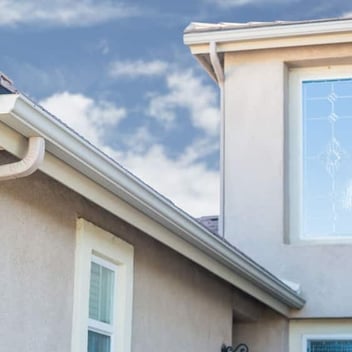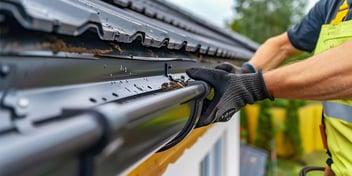- Home »
- Learningcenter »
- What are the best gutter guards
What Are The Best Gutter Guards In 2023?
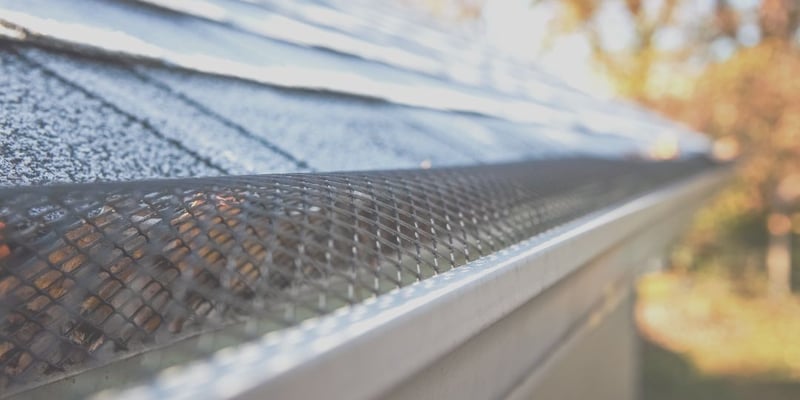
Anyone responsible for home maintenance is likely in agreement - cleaning gutters is a really tedious chore. You likely have heard of gutter guards as an option, but do you know about the different types that are available, and what their features are? In this article, we're going to tell you all about gutter guards, and our picks for some of the best ones in 2023.
What Is A Gutter Guard?
Gutter guards, also sometimes referred to as gutter screens, are devices that effectively cover your gutters, allowing water to still get in and drain away from your home, but keeping debris out, saving you the time and hassle of frequent gutter cleaning.
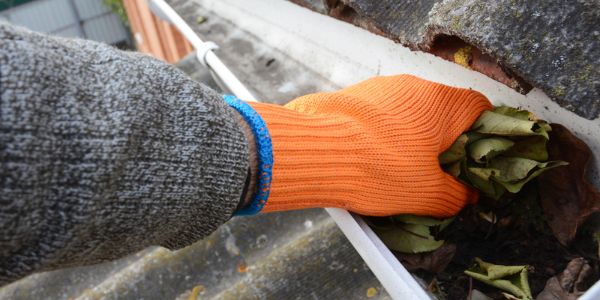
What Kind Of Gutter Guards Are There?
There are different types of gutter guards available, some of these being:
- Screen
- Mesh
- Micro-Mesh
- Reverse Curve (Surface Tension)
Lets take a closer look at each of these types.
Screen Guards
Screen gutter guards are an affordable option that can be installed on your own if you're handy. They have large holes that keep out leaves and debris, but the holes are larger than mesh or micro-mesh gutter guards, so they don't do well stopping smaller debris.
Screen gutter guards can also blow off in windy conditions, and since they are installed by sliding them under the bottom layer of roof shingles - this can cause additional roof damage.
Mesh
Mesh gutter guards are another good option, though they are slightly more expensive and more difficult to install if you are interested in tackling the project yourself. Mesh gutter guards are typically made of metal or plastic with small holes that block debris.
These gutter guards are installed by either slipping underneath the bottom row of shingles and snapping on top of your gutters, or being attached to the fascia. Mesh gutter guards can sometimes be flimsy however, and they can be damaged or torn rather easily.
Micro Mesh
Similar to mesh gutter guards, micro-mesh guards are designed with small holes to keep out debris. The key difference here is that with micro-mesh, the holes are even smaller and can stop even the tiniest debris from entering your gutters.
This option is one of the more expensive, because it can rarely be a DIY job, but they are quite effective at keeping debris out of your gutters and will be long lasting with little required maintenance.
Reverse Curve (Surface Tension)
Reverse curve gutter guards, also known as surface tension gutter guards, are a unique solution to keeping gutters free from debris. The shape of these gutter guards forces water over the gutter and around a downward curve - which effectively allows water into the gutter but not debris, which instead slide off.
It is not recommended to install this kind of gutter guard on your own, because it needs to be positioned at the same angle as your roof which can be tricky. Reverse curve gutter guards will also be seen from the ground, but they do come in several colors and finishes, and it's worth noting that these are some of the most successful at keeping debris out in any type of weather conditions.
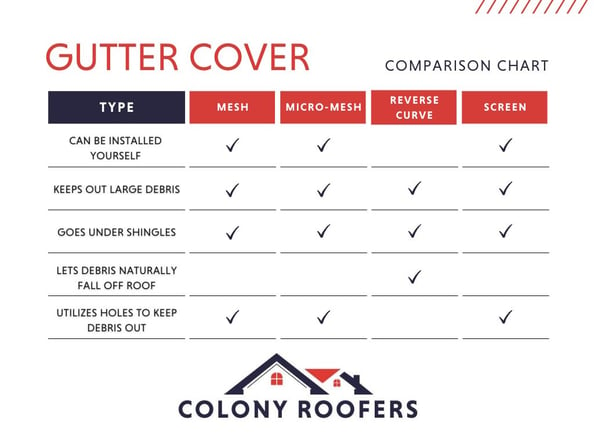
What Materials Are Gutter Guards Made From?
Gutter guards are made from four main materials:
- Plastic
- Aluminum
- Steel
- Copper
Plastic
Types of plastic like vinyl are typically used to manufacture some of the less expensive gutter guards on the market. It's great because it's affordable, and plastic will not rust (which can be an issue with metal gutter guards) but it can be damaged by UV rays and crack or warp.
Aluminum
Aluminum is a common material used for gutter guard screens. It boasts more strength than plastic, but it's still not as strong as some of the other materials commonly found in gutter guards. Aluminum is good at resisting temperature fluctuations, and is not prone to rust.
Steel
Steel (stainless steel) is commonly used for mesh screen gutter guards. Steel is much stronger than aluminum, but if it's not a stainless alloy or specially coated it's prone to rust and corrosion.
Copper
Copper isn't the most common material for gutter guards, but several companies do offer it as an option, usually to match copper gutter systems. It's stronger than aluminum, but not as strong as steel - although it has the added advantage of being naturally resistant to mold and mildew.
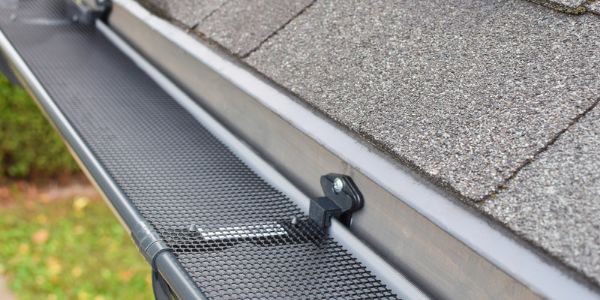
How Much Do Gutter Guards Cost?
So, how much should you expect to pay if you are interested in installing gutter guards? Unfortunately, because of the wide variety of options and the ability to DIY installation on some of them, it's hard to truly nail down a price since it varies so greatly. For inexpensive DIY gutter guard options, you can find gutter guards as cheap as $0.50 per foot. On the other hand, if you want high quality, professionally installed gutter guards, expect to pay up to $10 a foot.
What Gutter Guards Do We Recommend?
As always, we want to help you make the best decision for you and your home. Below, we're going to list some of our picks for the best gutter guards you can buy in 2023.
Debris Guard
Debris Guard™ is a reverse curve gutter guard system. As with all surface tension type gutter guards, the water wraps around the edge of the gutter while the debris continue off the edge of the roof. What is unique about Debris Guard, is that there are only two clips per five foot section, which eliminates many potential areas where debris may become trapped.
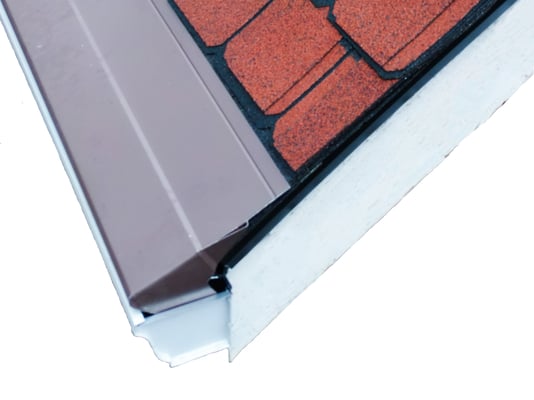
Pros
- Easy to install
- Cost effective
- Available in 28 colors
- Patented design works better overall than most reverse curve systems
Cons
- Can be seen from the ground
Spectra Eco Guard
Spectra Eco Guard offers both mesh and micro-mesh gutter guards. They successfully keep debris out of your gutters while also utilizing a unique drip design to help slow the flow of water. Spectra Eco Guard gutter guards are made of aluminum, so they are also resistant to rust.
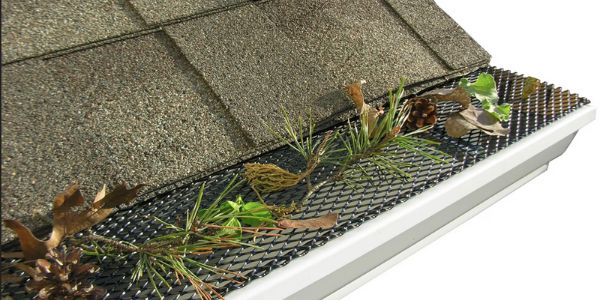
Pros
- Can't be seen from the ground
- Drip design helps keep the face of your gutters clean
- Resistant to rust
- Comes in several sizes to fit virtually all gutter systems
Cons
- Not many color options available
- They still need to have debris cleared off - debris won't clog your gutters but it will still need to periodically be brushed off
Senox Aqua Duct
The AqueDUCT® Screen Hanger System features a louvered cover with a stainless steel screen. This provides a clog-free gutter system without the need of additional hangers. AqueDUCT® also features the Pocket Lock Lip® that allows simple and secure installation and resists water and dirt build up.
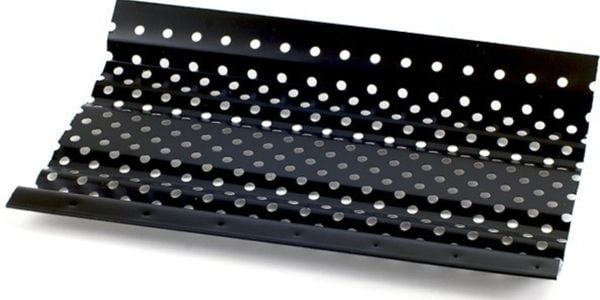
-
Pros
- Can't be seen from the ground
- System ensures everything matches
- Resistant to rust
- Designed to prevent gutters pulling away from the house
Cons
- Not as affordable as other options
- Don't allow debris to slide off
- Need to be installed with Senox gutters for an entire system
Interested In Gutter Guards?
When looking at gutter guards it's important to keep a few things in mind, such as your roof's warranty and whether or not it will be affected by the installation of the gutter guards (some gutter guards require the bottom layer of shingles to be lifted up, which can void some roof warranties if not done by a professional), and what your preferred aesthetics are. Some gutter guards can be seen from the ground, so depending on the look you'd like for your home you may want to consider one that is hidden from view, or one that comes in a color that matches your home's exterior.
If you are interested in adding gutter guards to your home's gutter system, or have questions about gutter guards, give us a call at Colony Roofers! We offer free 30 minute inspections, and our team is always ready and happy to answer any question you may have.
 Call (678) 365-3138
Call (678) 365-3138

